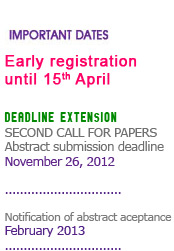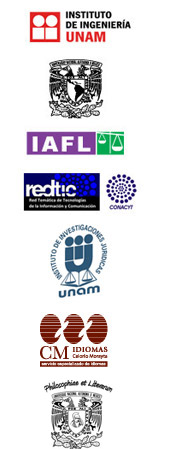

![]()
 ...............................
...............................
![]()

This is a provisional program of the conference. Definitive program will be updated one month before the conference.
Monday, 24th June |
|||
| 10:00 – 12:30 | Optional visit | ||
| 12:30 -13:30 | Plenary: M Teresa Turell | ||
| 13:30 -14:30 | Lunch | ||
| Police Interview | Authorship analysis and author profiling | Courtroom discourse | |
| 14:30 -15:00 | Elisabeth Carter. “Everything but the truth: Analysing the interactional construction of deceptive utterances in the police interview” | Gerardo Sierra, Fernanda López, Carlos Méndez, Julián Solórzano and Eduardo Méndez. “Exploring stylometric measures for authorship attribution” |
Lucia Freitas. “Judgments of Brazil’s Superior Court of Justice on processes of domestic violence: a critical discourse analysis” |
| 15:00-15:30 | Wesley Clark. “Narrative-Based Interviewing; Taking the Confrontation out of Police Interviews” | Ria Perkins. “NLID: Native language Identification, a forensic casework perspective” | Daniela Negraes and Ana Ostermann. “The use of formulation in face-to-face courtroom interrogation” |
| 15:30 – 16:00 | Jennifer Glougie. “The Multifunctionality of Discourse Markers in Police Interviews; the case of "actually"” |
Sheila Queralt Estévez and Maria Teresa Turell Julià. “The implementation of the Likelihood-Ratio framework in spoken and written Spanish” |
Sheikh Kamarah. “The Role of metaphor in judicial discourse: The case of the Civil Defense Force in the Special Court for Sierra Leone” |
| 16:00 – 16:30 | David García-Barrero and José García-Verdugo. “Cohesive elements in forensic textual analysis: Punctuation and conjunctions as linguistic evidence in Arabic” |
Youping Xu. “The Performance and Dynamic Change of Judges’ Dual Roles in Court Conciliation of Chinese Civil Cases” |
|
16:30 – 17:00 |
Coffee Break |
||
17:00 – 18:30 |
Poster exhibition |
||
Tuesday, 25th June |
||||
9:00 – 10:00 |
Plenary: Peter Gray |
|||
10:00 -10:30 |
Coffee Break |
|||
|
Sociolinguistics and author profiling |
Police Interview and public legal education discourse |
|
|
10:30 - 11:00 |
Dayane Almeida. “Sociolinguistic Profiling in Brazilian Portuguese” |
Philip Gaines. “Radical Reformulation as Resistance in a Post-Sting Police Interview” |
|
|
11:00-11:30 |
Tim Grant and Nicci MacLeod. “Providing analysis and training for linguistic identity disguise” |
Guusje Jol and Fleur van der Houwen. “Dealing with ‘I don’t know’ answers in police interviews with children” |
|
|
11:30 – 12:00 |
Alberto Gomez. |
Chuanyou Yuan and Dongmei Chen. |
|
|
12:00 – 12:30 |
Coffee Break |
|||
|
Forensic Phonetics | Deception and threatening detection | Plagiarism and textual similarity |
|
12:30 – 13:00 |
Susanto Susanto. “Synchronic Stability Vowel System: A proposal for forensic speaker identification in Bahasa Indonesia” |
Joseph Devney. “Deception without Lying: The question of election fraud in New Hampshire” |
Rui Sousa-Silva. “‘Caught in translation’: A forensic linguistics approach to detecting ‘translingual’ plagiarism” |
|
13:00 – 13:30 |
Jorge Sommerhoff and Claudia Rosas “Forensic implications of the correlation between STI and subjective intelligibility test for Spanish” |
Tammy Gales and Antonio Rico-Sulayes. “Classifying Realized and Non-Realized Written Threats: A Machine Learning Approach to the Detection of Threatening Discourse Relevant for Criminal Investigation” |
Juan-Manuel Torres Moreno and Gerardo Sierra. |
|
13:30 – 14:30 |
Lunch |
|||
|
Court interpreting |
Forensic Phonetics | Legal language | |
14:30 – 15:00 |
Louisa Shen. “Court Interpreter's Impact on Information Flow in Mainland Chinese Criminal Court — An Analysis Based on Question and Answer Legal Discourse” |
Raquel Vale. “Phonological processing by adolescents in correctional institutions: legal implications” |
Joao Pedro Padua. “Where did this law come from? -- The question of legislator's intent and of how can we find it” |
|
15:00 – 15:30 |
Eva Ng. |
Jordi Cicres. “Forensic Voice Comparison of Filled Pauses: a Multidimensional Analysis” |
Diana Yankova. |
|
15:30 – 16:00 |
|
Claudia Rosas, Jorge Sommerhoff, César Sáez and José Novoa. “Characterization of the recorded audios of cases that entered the chilean investigation police -PDI- 2006–2010” |
Gail Stygall. “Death Penalty Jury Instructions: Still No Mitigation” |
|
16:00 – 16:30 |
Coffee Break |
|||
16:30 – 17:30 |
Plenary: Diego Valadés |
|||
17:30 – 18:30 |
IAFL Business Meeting |
|||
Wednesday, 26th June |
||||
9:00 – 10:00 |
Plenary: Edward Finegan |
|||
10:00 -10:30 |
Coffee Break |
|||
|
Courtroom discourse | Legal language | Trademark | |
10:30 -11:00 |
Patrick Juola. “An Information-Theoretic Reevaluation of the Complexity of US Supreme Court Decisions” | Terrence R Carney. “Primates as metaphors: a consideration of the word "baboon" in the hate speech case Herselman v Geleba” |
Ronald Butters. “Likelihood of linguistic confusion of Trademarks in Two US Language Communities: The Case of CASIQUE versus CASICA” | |
11:00-11:30 |
Mel Greenlee. “Contradictions, context and capital voir dire” | Emmanuel Satia and Kembo Sure. “Hate speech in Kenya: nature and challenges” | Sandra Ferrari Disner. “Sound analysis of trademarks” |
|
11:30 – 12:00 |
Janny Leung. “As good as it gets? Unrepresented litigant and courtroom dynamics: a case study” | Susan Berk-Seligson. ““How do you know when someone is a member of a youth gang?”: The linguistic construction of gang membership in Guatemala” |
||
12:00 – 12:30 |
Coffee Break | |||
|
Authorship analysis | Courtroom discourse | ||
12:30 – 13:00 |
Patrick Juola. “A Critical Analysis of the Ceglia/Zuckerberg Email Authorship Study” |
Li li and Zhao Hongfang. “Discursive Features of the Less Powerful in Courtroom Trials in China” |
||
13:00 – 13:30 |
Fernanda López-Escobedo, Alfonso Medina-Urrea, Ariana Paz. “Affix analysis as a marker for authorship attribution” | Christian Licoppe, Maud Verdier and Laurence Dumoulin. “Interacting in the courtroom through a video link: Courtroom” | ||
13:30 – 14:30 |
Lunch | |||
|
Legal language | Translation | Court interpreting | |
14:30 – 15:00 |
Qing Zhang. “On the Language Used in Chinese Criminal Defenses” |
Monwabisi Ralarala. “Transpreters’ translation of complainants’ narratives as evidence: Whose version goes to court?” |
Ikuko Nakane. “Construction of suspects’ narratives in interpreter-mediated police interviews” |
|
15:00 – 15:30 |
Margarita Palacios. |
Luciane Frohlich. “Analysing language patterns in the german translation of the Brazilian Civil Code” |
Edilson Lima. |
|
15:30 – 16:00 |
Anita Soboleva. “Legal definitions as a means to overcome polysemy in legal discourse” |
Mohammed H. M. Al Aqad. “Linguistic Analysis of Deontic Modality in Writing Forensic Reports: The Case Study of Malaysian Forensic Reports” |
Ann Wennerstrom. “Faking it: can a forensic assessment of language proficiency detect it? ” |
|
16:00 -16:30 |
Coffee Break |
|||
|
Courtroom discourse and forensic discourse |
Legal language |
|
|
16:30 – 17:00 |
Susan Ehrlich. “The Strategic Animation of Race in Courtroom Discourse” |
Eliseu Mabasso. “Official language, written and customary laws in Mozambican Police Stations” |
|
|
17:00 – 17:30 |
Kong Wo Tang. |
SvetlanaVlasenko. “Conceptualizing and Verbalizing the Same Legal Substance: Legal Euro-English and Other Legal Englishes” |
|
|
17:30 - 18:00 |
Chris Heffer. “Rhetoric and Rights: A Theory of Forensic Discourse” |
Brian Slocum. “Ordinary Meaning” |
|
|
18:00 |
Coaches depart for Conference Dinner |
|||
18:00 – 22:00 |
Conference Dinner |
|||
Thursday, 27th June |
|||
10:00 – 11:00 |
Plenary: Georganne Weller |
||
11:00 -11:30 |
Coffee Break |
||
|
Author profiling and online identities |
Legal language and Language Policy |
|
11:30 -12:00 |
(13) Nicci MacLeod and Tim Grant. |
(31) Lorenzo Patino. “Comprehension & comprehensibility in English language immigration forms: An examination and comparison of syntactic structures & semantic interpretation in English language immigration forms” |
|
12:00-12:30 |
(41) Giorgos Georgiou. “Unmasking discourse strategies in on-line children solicitation” |
(84) Bethany Dumas. “Jurors as Non-native Speakers of Legalese” |
|
12:30 – 13:00 |
(35) Andrea Nini. “Authorship profiling as a diagnostic process” |
(39) Margaret van Naerssen. |
|
13:00 – 13:30 |
|
(53) Azirah Hashim and Richard Powell. “Language Policy and Practice: Civil and Syariah Law Courts in Malaysia” |
|
13:30 – 14:30 |
Lunch |
||
14:30 – 16:30 |
Colloquium: Making Linguistics Relevant to the Law. |
||
Moderator: Diana Eades |
|||
|
Janet Ainsworth. “Training Lawyers How to Make Linguistics Relevant to Law” Wes Clark. Diana Eades. “Communication eccentricities, to put it neutrally”: Making Sociolinguistic Research about Aboriginal English Relevant to the Law Sandra Hale. “Approaching the Bench: bridging the linguistic gap between interpreters and the judiciary” Georgina Heydon and Andy Griffiths “Topic management in police interviewing: a change for the better?” Mami Hiraike Okawara and Kazuhiko Higuchi. “For a Good Future of Forensic Linguistics in Japan” Commentators: Bethany Dumas and Justice Peter Gray |
||
Poster exhibition
Weiming Liu, Shuying Liu and Qinglin Ma. “Balanced Approaches to Branching Sentences in the Translation of Legal Theoretical Monographs”
Valda De Oliveira Fagundes. “Far beyond the vestiges of the memory: to whom does this field belong?”
Jie Wang and Zhi’An You. “To Study the Frequent Words in Chinese Legislation”
Yuzhen Cui. “The Stylistic Features of Interrogation Transcripts in China – A Corpus-based Study”
Zhenfeng Wang. “On Judgment Argumentation in China”
Kai Li. “The Writing of Bill of Indictment in China”
Yuhua Zou. “A Philosophical Reflection on the Standardization of Legal language”
Elia Sánchez. “A linguistic approach to drafting legislation in Mexico”